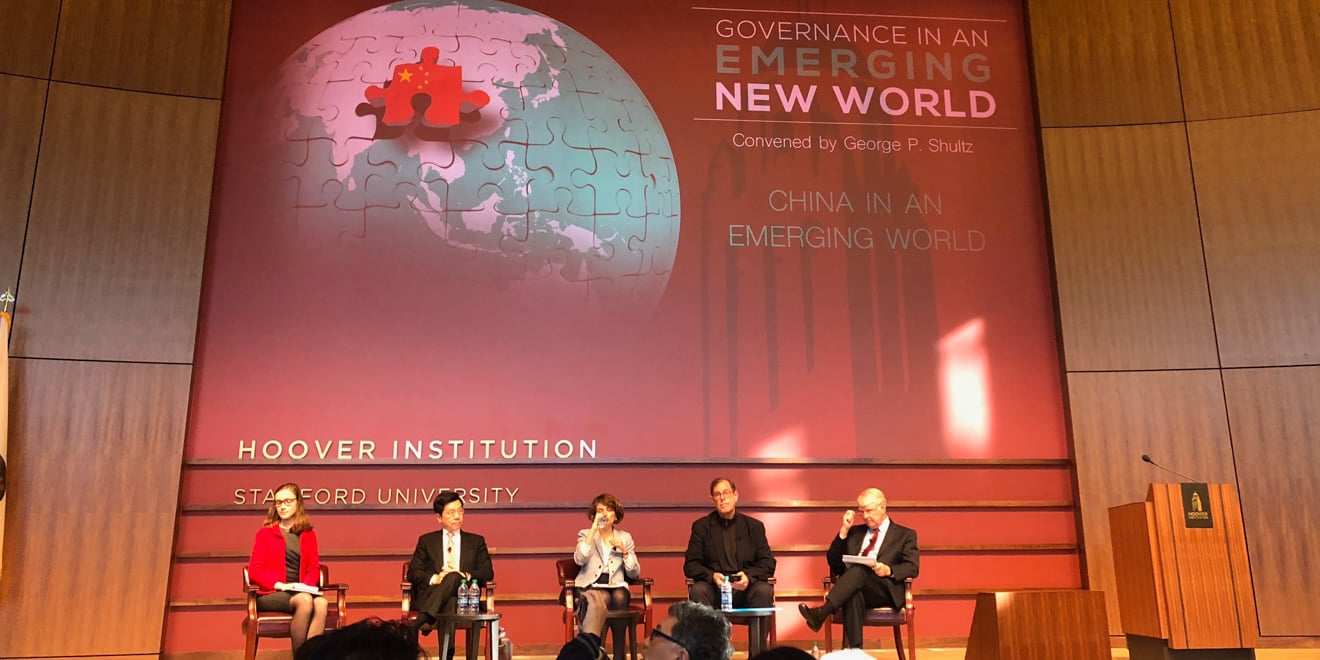On Monday, the Hoover Institution held a panel discussion on China’s upcoming governance challenges in light of national demographic, technological and societal shifts. The event was the second in the Institution’s “Governance in an Emerging World” series, taking place in Hauck Auditorium.
The panel included Nicholas Eberstadt, Henry Wendt Chair in Political Economy at the American Enterprise Institute; Maria Repnikova, an assistant professor at Georgia State University; Kai-Fu Lee, Chairman and CEO of Senovation Ventures; and Elsa Kania, fellow at the Center for a New American Security. Admiral Gary Roughead moderated the event.
Eberstadt began the discussion by addressing the risks China will face in light of rapidly aging population. He said that, as China’s working-age population declines, the proportion of China’s senior-age population will grow by 4 percent each year, putting tremendous pressure on China’s “rudimentary” social welfare network, especially in rural areas.
Repnikova followed with comments on how the Chinese government is adapting to the rise of social media and a growing public opinion sphere. She argued that China’s censorship of social media is importantly accompanied by an increased state responsiveness to public concerns.
“Many people don’t pay attention to the growing Chinese state’s responsiveness to public concerns online,” Repnikova said. “Many [Chinese] officials are assigned to open up their social media pages to interact with the public and study public opinion.”
Lee addressed the emergence of China as an artificial intelligence superpower, challenging the common belief that AI innovation was concentrated in the U.S.
“I [want to] attack three myths people have. The first is that Silicon Valley is the center of innovation in the world, the second is that the AI is some fancy technology that only the U.S. can be ahead in and the third is that China is doing anything in AI due to governmental support,” Lee said. “These three are identifiably false.”
Lee noted that, while the United States remains ahead of China on AI research and development, China is the world’s expert in the implementation and monetization of the technology. He urged that the high usage rate of Chinese AI applications contributes to the country’s flourishing tech environment, where venture capitalists invest 30 percent more money in AI than its U.S. counterparts.
“The most valuable speech recognition companies, machine translation companies, drone companies, computer vision companies [and] facial recognition companies, are all Chinese,” Lee said.
More than half of the event was reserved for a question and answer session. Audience members pressed the panel on issues ranging from the future of U.S.-China relations to the ethics of artificial intelligence.
For third-year management science and engineering master’s student Helen Yang, the event helped place her technical education within a broader social context.
“I’ve been an engineer for so long, and I wanted to have a broader perspective about politics and business … I found this event to be perfect for me since I have background knowledge as a Chinese,” Yang said.
Lulu Wang, a first-year Ph.D. student in the Graduate School of Business, said that the talk serves as “a good reminder that, [while] a lot of conversations about China treat it as one undifferentiated mass run by one centralized government, the reality is that China is very diverse.”
“Governance in the Emerging World” is organized by George P. Shultz, Distinguished Fellow at the Hoover Institution, who previously served as the 60th Secretary of State. The next event in the Hoover series is titled “The Information Challenge to Democracy” and will take place on Nov. 13.
Contact Berber Jin at fjin16 ‘at’ stanford.edu.
